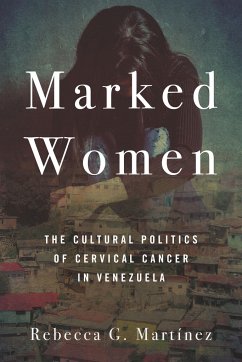- Gebundenes Buch
- Merkliste
- Auf die Merkliste
- Bewerten Bewerten
- Teilen
- Produkt teilen
- Produkterinnerung
- Produkterinnerung
Rebecca G. Mart¿z is Assistant Professor of Women's and Gender Studies at the University of Missouri.
Andere Kunden interessierten sich auch für
![A Blessing and a Curse A Blessing and a Curse]() Matt WildeA Blessing and a Curse33,99 €
Matt WildeA Blessing and a Curse33,99 €![Sufi Civilities Sufi Civilities]() Annika SchmedingSufi Civilities35,99 €
Annika SchmedingSufi Civilities35,99 €![American Shtetl American Shtetl]() Nomi M. StolzenbergAmerican Shtetl22,99 €
Nomi M. StolzenbergAmerican Shtetl22,99 €![Dilemmas of Allyship Dilemmas of Allyship]() Zachary SundermanDilemmas of Allyship43,99 €
Zachary SundermanDilemmas of Allyship43,99 €![Projectland Projectland]() Holly HighProjectland32,99 €
Holly HighProjectland32,99 €![If Truth Be Told If Truth Be Told]() If Truth Be Told188,99 €
If Truth Be Told188,99 €![Talking Indian Talking Indian]() Jenny L. DavisTalking Indian38,99 €
Jenny L. DavisTalking Indian38,99 €-
-
-
Rebecca G. Mart¿z is Assistant Professor of Women's and Gender Studies at the University of Missouri.
Hinweis: Dieser Artikel kann nur an eine deutsche Lieferadresse ausgeliefert werden.
Hinweis: Dieser Artikel kann nur an eine deutsche Lieferadresse ausgeliefert werden.
Produktdetails
- Produktdetails
- Verlag: Stanford University Press
- Seitenzahl: 296
- Erscheinungstermin: 5. Juni 2018
- Englisch
- Abmessung: 264mm x 119mm x 36mm
- Gewicht: 610g
- ISBN-13: 9781503605114
- ISBN-10: 1503605116
- Artikelnr.: 49226573
- Herstellerkennzeichnung
- Libri GmbH
- Europaallee 1
- 36244 Bad Hersfeld
- gpsr@libri.de
- Verlag: Stanford University Press
- Seitenzahl: 296
- Erscheinungstermin: 5. Juni 2018
- Englisch
- Abmessung: 264mm x 119mm x 36mm
- Gewicht: 610g
- ISBN-13: 9781503605114
- ISBN-10: 1503605116
- Artikelnr.: 49226573
- Herstellerkennzeichnung
- Libri GmbH
- Europaallee 1
- 36244 Bad Hersfeld
- gpsr@libri.de
Rebecca G. Martínez is Assistant Professor of Women's and Gender Studies at the University of Missouri.
Contents and Abstracts
1Hospitals, Patients, and Doctors
chapter abstract
This chapter provides descriptions of the two hospitals where the
ethnographic research was conducted: Hospital Oncológico Padre Machado and
Hospital Oncológico Razetti. Women whose stories are a central part of this
project, as well as those of the doctors who treat them, are introduced
through vignettes. Demographic profiles are included of patients and
doctors interviewed at both hospitals. A concise but important
understanding of race in Venezuela is also included. Venezuela is a country
that has embraced a mythical ideology of café con leche, meaning that
racism is deemed nonexistent because the country's people are considered
racially "mixed": like black coffee with milk. However, race, class, and
gender all figure into the social construction of cervical cancer risk.
2The Ambiguities of Risk: Morality, Hygiene, and the "Other"
chapter abstract
An epidemiological profile of cervical cancer risks found in the medical
literature is compared to those perceptions of risk mentioned by doctors
and patients. The doctors mentioned epidemiologically supported risks such
as multiple sexual partners and sex at an early age, as well as risks that
are not supported epidemiologically, such as lack of hygiene and lack of
culture. In articulating risk, doctors focus on social class, culture,
hygiene, and morality in their profiles of risk. The women's risk factors
concentrated on the effect of economic disadvantage on medical care access,
though not in relation to behavior (promiscuity and uncleanliness), as can
be discerned from many of the doctors' discussions of cervical cancer.
3Targeting Women: Bodies out of "Control," Public Health, and the Body
Politic
chapter abstract
This chapter investigates the role of public health education in the
prevention of cervical cancer, analyzing the public health literature
designed to educate women about this disease. This literature is
contextualized by addressing popular ideas about the relationship among
class, culture, and health, including interviews with public health
officials, articles in national newspapers, and scholarly research on class
and violence in Venezuela. Threats to progress, modernity, and Venezuelan
culture are pervasive themes in discourses about poverty and disease. Just
as important, the discourse surrounding cervical cancer in Venezuela must
be understood within a social, economic, and political climate that over
the past three decades has been unstable and, at times, quite volatile. A
cultural politics of disease has emerged in which culture (and cultural
difference) is significant for understanding and explaining the problem of
cervical cancer by the media, the public health arena, and the medical
community in general.
4The Hospital Encounter: Bodies Marked, Mended, and Manipulated
chapter abstract
This chapter focuses on the medical examination itself, with emphasis
placed on relationships of power in this very physical-bodily-manifestation
of the patient-doctor interaction. The body is an important site for
understanding how distinctions, of class, in particular, are produced,
inscribed, and represented in the bodies of women (e.g., the state of her
cervix, cleanliness). Special attention is paid to the ways in which the
patients are treated as objects of medical knowledge and manipulation: the
ways they are positioned, inspected, and talked to (or not). In doing so,
the structural problems that contribute to a lack of resources at the
public hospital including little space, improper equipment, and
insufficient time to interact adequately with patients and better inform
them of their medical conditions are underscored. Women's narratives of
their medical treatment, which are, at times, acted on to contest and
circumvent some disciplinary forms, are also analyzed.
5Women's Agency and Resilience: "They Way I Want to Be Treated"
chapter abstract
The chapter looks at how the diverse women in the hospital are disciplined
and regulated. This category of women includes female patients, nurses,
secretaries, doctoras (female doctors), technicians, and the female
anthropologist. At the same time, emphasis is placed on how the women
negotiate and contest that process. Women's agency is thus illuminated. For
patients, their agency includes ways of finding out information about their
own health that is not directly shared with them by medical personnel. The
patient-doctor interaction is a space where patients have little power, but
they also look for ways to negotiate and resist their lack of power.
Moreover, a section is also devoted to sexual harassment in the field by
providing the narrative experience of the researcher. All of these women's
experiences converge to highlight agency in the face of the patriarchal
hospital setting.
Epilogue: From Neoliberalism to Chávez
chapter abstract
The epilogue focuses on 2008 fieldwork during the Chávez administration. It
considers some changes that have taken place in health care under the
socialism of the Chávez administration. Cultural politics of health
function very differently under the neoliberalism of the 1980s and 1990s
compared to the Chávez era. Tracing the social configurations of this
disease from the neoliberalism of the 1990s to the era of socialism, the
epilogue maps out the ways in which class, gender, and race shape disease
as a product of cultural politics. During the Chávez era, the government
focused on health care and the development of Misión Barrio Adentro as
transformation for the nation through the Bolivarian Revolution. Public
health attention to cervical cancer in this context has emphasized
structural change as opposed to individual behaviors. In other words, the
very definitions of disease are formed within specific social, cultural,
and historical moments.
Introduction: Caracas, Venezuela: On Arrival
chapter abstract
The introduction of the book provides an overview of the ethnographic
project. It outlines a brief history of the neoliberal period in which this
ethnography is situated in order to provide necessary context for the
fieldwork findings. Importantly, the political context with International
Monetary Fund and World Bank regulations set the stage for the structural
adjustments that will greatly affect the public health sector. The focus on
individualism that neoliberalism embraces also helps situate analysis of
patient-doctor interactions and public health educational pamphlets. The
introduction also outlines the chapters so they reader has a preview of the
topics covered in the book.
1Hospitals, Patients, and Doctors
chapter abstract
This chapter provides descriptions of the two hospitals where the
ethnographic research was conducted: Hospital Oncológico Padre Machado and
Hospital Oncológico Razetti. Women whose stories are a central part of this
project, as well as those of the doctors who treat them, are introduced
through vignettes. Demographic profiles are included of patients and
doctors interviewed at both hospitals. A concise but important
understanding of race in Venezuela is also included. Venezuela is a country
that has embraced a mythical ideology of café con leche, meaning that
racism is deemed nonexistent because the country's people are considered
racially "mixed": like black coffee with milk. However, race, class, and
gender all figure into the social construction of cervical cancer risk.
2The Ambiguities of Risk: Morality, Hygiene, and the "Other"
chapter abstract
An epidemiological profile of cervical cancer risks found in the medical
literature is compared to those perceptions of risk mentioned by doctors
and patients. The doctors mentioned epidemiologically supported risks such
as multiple sexual partners and sex at an early age, as well as risks that
are not supported epidemiologically, such as lack of hygiene and lack of
culture. In articulating risk, doctors focus on social class, culture,
hygiene, and morality in their profiles of risk. The women's risk factors
concentrated on the effect of economic disadvantage on medical care access,
though not in relation to behavior (promiscuity and uncleanliness), as can
be discerned from many of the doctors' discussions of cervical cancer.
3Targeting Women: Bodies out of "Control," Public Health, and the Body
Politic
chapter abstract
This chapter investigates the role of public health education in the
prevention of cervical cancer, analyzing the public health literature
designed to educate women about this disease. This literature is
contextualized by addressing popular ideas about the relationship among
class, culture, and health, including interviews with public health
officials, articles in national newspapers, and scholarly research on class
and violence in Venezuela. Threats to progress, modernity, and Venezuelan
culture are pervasive themes in discourses about poverty and disease. Just
as important, the discourse surrounding cervical cancer in Venezuela must
be understood within a social, economic, and political climate that over
the past three decades has been unstable and, at times, quite volatile. A
cultural politics of disease has emerged in which culture (and cultural
difference) is significant for understanding and explaining the problem of
cervical cancer by the media, the public health arena, and the medical
community in general.
4The Hospital Encounter: Bodies Marked, Mended, and Manipulated
chapter abstract
This chapter focuses on the medical examination itself, with emphasis
placed on relationships of power in this very physical-bodily-manifestation
of the patient-doctor interaction. The body is an important site for
understanding how distinctions, of class, in particular, are produced,
inscribed, and represented in the bodies of women (e.g., the state of her
cervix, cleanliness). Special attention is paid to the ways in which the
patients are treated as objects of medical knowledge and manipulation: the
ways they are positioned, inspected, and talked to (or not). In doing so,
the structural problems that contribute to a lack of resources at the
public hospital including little space, improper equipment, and
insufficient time to interact adequately with patients and better inform
them of their medical conditions are underscored. Women's narratives of
their medical treatment, which are, at times, acted on to contest and
circumvent some disciplinary forms, are also analyzed.
5Women's Agency and Resilience: "They Way I Want to Be Treated"
chapter abstract
The chapter looks at how the diverse women in the hospital are disciplined
and regulated. This category of women includes female patients, nurses,
secretaries, doctoras (female doctors), technicians, and the female
anthropologist. At the same time, emphasis is placed on how the women
negotiate and contest that process. Women's agency is thus illuminated. For
patients, their agency includes ways of finding out information about their
own health that is not directly shared with them by medical personnel. The
patient-doctor interaction is a space where patients have little power, but
they also look for ways to negotiate and resist their lack of power.
Moreover, a section is also devoted to sexual harassment in the field by
providing the narrative experience of the researcher. All of these women's
experiences converge to highlight agency in the face of the patriarchal
hospital setting.
Epilogue: From Neoliberalism to Chávez
chapter abstract
The epilogue focuses on 2008 fieldwork during the Chávez administration. It
considers some changes that have taken place in health care under the
socialism of the Chávez administration. Cultural politics of health
function very differently under the neoliberalism of the 1980s and 1990s
compared to the Chávez era. Tracing the social configurations of this
disease from the neoliberalism of the 1990s to the era of socialism, the
epilogue maps out the ways in which class, gender, and race shape disease
as a product of cultural politics. During the Chávez era, the government
focused on health care and the development of Misión Barrio Adentro as
transformation for the nation through the Bolivarian Revolution. Public
health attention to cervical cancer in this context has emphasized
structural change as opposed to individual behaviors. In other words, the
very definitions of disease are formed within specific social, cultural,
and historical moments.
Introduction: Caracas, Venezuela: On Arrival
chapter abstract
The introduction of the book provides an overview of the ethnographic
project. It outlines a brief history of the neoliberal period in which this
ethnography is situated in order to provide necessary context for the
fieldwork findings. Importantly, the political context with International
Monetary Fund and World Bank regulations set the stage for the structural
adjustments that will greatly affect the public health sector. The focus on
individualism that neoliberalism embraces also helps situate analysis of
patient-doctor interactions and public health educational pamphlets. The
introduction also outlines the chapters so they reader has a preview of the
topics covered in the book.
Contents and Abstracts
1Hospitals, Patients, and Doctors
chapter abstract
This chapter provides descriptions of the two hospitals where the
ethnographic research was conducted: Hospital Oncológico Padre Machado and
Hospital Oncológico Razetti. Women whose stories are a central part of this
project, as well as those of the doctors who treat them, are introduced
through vignettes. Demographic profiles are included of patients and
doctors interviewed at both hospitals. A concise but important
understanding of race in Venezuela is also included. Venezuela is a country
that has embraced a mythical ideology of café con leche, meaning that
racism is deemed nonexistent because the country's people are considered
racially "mixed": like black coffee with milk. However, race, class, and
gender all figure into the social construction of cervical cancer risk.
2The Ambiguities of Risk: Morality, Hygiene, and the "Other"
chapter abstract
An epidemiological profile of cervical cancer risks found in the medical
literature is compared to those perceptions of risk mentioned by doctors
and patients. The doctors mentioned epidemiologically supported risks such
as multiple sexual partners and sex at an early age, as well as risks that
are not supported epidemiologically, such as lack of hygiene and lack of
culture. In articulating risk, doctors focus on social class, culture,
hygiene, and morality in their profiles of risk. The women's risk factors
concentrated on the effect of economic disadvantage on medical care access,
though not in relation to behavior (promiscuity and uncleanliness), as can
be discerned from many of the doctors' discussions of cervical cancer.
3Targeting Women: Bodies out of "Control," Public Health, and the Body
Politic
chapter abstract
This chapter investigates the role of public health education in the
prevention of cervical cancer, analyzing the public health literature
designed to educate women about this disease. This literature is
contextualized by addressing popular ideas about the relationship among
class, culture, and health, including interviews with public health
officials, articles in national newspapers, and scholarly research on class
and violence in Venezuela. Threats to progress, modernity, and Venezuelan
culture are pervasive themes in discourses about poverty and disease. Just
as important, the discourse surrounding cervical cancer in Venezuela must
be understood within a social, economic, and political climate that over
the past three decades has been unstable and, at times, quite volatile. A
cultural politics of disease has emerged in which culture (and cultural
difference) is significant for understanding and explaining the problem of
cervical cancer by the media, the public health arena, and the medical
community in general.
4The Hospital Encounter: Bodies Marked, Mended, and Manipulated
chapter abstract
This chapter focuses on the medical examination itself, with emphasis
placed on relationships of power in this very physical-bodily-manifestation
of the patient-doctor interaction. The body is an important site for
understanding how distinctions, of class, in particular, are produced,
inscribed, and represented in the bodies of women (e.g., the state of her
cervix, cleanliness). Special attention is paid to the ways in which the
patients are treated as objects of medical knowledge and manipulation: the
ways they are positioned, inspected, and talked to (or not). In doing so,
the structural problems that contribute to a lack of resources at the
public hospital including little space, improper equipment, and
insufficient time to interact adequately with patients and better inform
them of their medical conditions are underscored. Women's narratives of
their medical treatment, which are, at times, acted on to contest and
circumvent some disciplinary forms, are also analyzed.
5Women's Agency and Resilience: "They Way I Want to Be Treated"
chapter abstract
The chapter looks at how the diverse women in the hospital are disciplined
and regulated. This category of women includes female patients, nurses,
secretaries, doctoras (female doctors), technicians, and the female
anthropologist. At the same time, emphasis is placed on how the women
negotiate and contest that process. Women's agency is thus illuminated. For
patients, their agency includes ways of finding out information about their
own health that is not directly shared with them by medical personnel. The
patient-doctor interaction is a space where patients have little power, but
they also look for ways to negotiate and resist their lack of power.
Moreover, a section is also devoted to sexual harassment in the field by
providing the narrative experience of the researcher. All of these women's
experiences converge to highlight agency in the face of the patriarchal
hospital setting.
Epilogue: From Neoliberalism to Chávez
chapter abstract
The epilogue focuses on 2008 fieldwork during the Chávez administration. It
considers some changes that have taken place in health care under the
socialism of the Chávez administration. Cultural politics of health
function very differently under the neoliberalism of the 1980s and 1990s
compared to the Chávez era. Tracing the social configurations of this
disease from the neoliberalism of the 1990s to the era of socialism, the
epilogue maps out the ways in which class, gender, and race shape disease
as a product of cultural politics. During the Chávez era, the government
focused on health care and the development of Misión Barrio Adentro as
transformation for the nation through the Bolivarian Revolution. Public
health attention to cervical cancer in this context has emphasized
structural change as opposed to individual behaviors. In other words, the
very definitions of disease are formed within specific social, cultural,
and historical moments.
Introduction: Caracas, Venezuela: On Arrival
chapter abstract
The introduction of the book provides an overview of the ethnographic
project. It outlines a brief history of the neoliberal period in which this
ethnography is situated in order to provide necessary context for the
fieldwork findings. Importantly, the political context with International
Monetary Fund and World Bank regulations set the stage for the structural
adjustments that will greatly affect the public health sector. The focus on
individualism that neoliberalism embraces also helps situate analysis of
patient-doctor interactions and public health educational pamphlets. The
introduction also outlines the chapters so they reader has a preview of the
topics covered in the book.
1Hospitals, Patients, and Doctors
chapter abstract
This chapter provides descriptions of the two hospitals where the
ethnographic research was conducted: Hospital Oncológico Padre Machado and
Hospital Oncológico Razetti. Women whose stories are a central part of this
project, as well as those of the doctors who treat them, are introduced
through vignettes. Demographic profiles are included of patients and
doctors interviewed at both hospitals. A concise but important
understanding of race in Venezuela is also included. Venezuela is a country
that has embraced a mythical ideology of café con leche, meaning that
racism is deemed nonexistent because the country's people are considered
racially "mixed": like black coffee with milk. However, race, class, and
gender all figure into the social construction of cervical cancer risk.
2The Ambiguities of Risk: Morality, Hygiene, and the "Other"
chapter abstract
An epidemiological profile of cervical cancer risks found in the medical
literature is compared to those perceptions of risk mentioned by doctors
and patients. The doctors mentioned epidemiologically supported risks such
as multiple sexual partners and sex at an early age, as well as risks that
are not supported epidemiologically, such as lack of hygiene and lack of
culture. In articulating risk, doctors focus on social class, culture,
hygiene, and morality in their profiles of risk. The women's risk factors
concentrated on the effect of economic disadvantage on medical care access,
though not in relation to behavior (promiscuity and uncleanliness), as can
be discerned from many of the doctors' discussions of cervical cancer.
3Targeting Women: Bodies out of "Control," Public Health, and the Body
Politic
chapter abstract
This chapter investigates the role of public health education in the
prevention of cervical cancer, analyzing the public health literature
designed to educate women about this disease. This literature is
contextualized by addressing popular ideas about the relationship among
class, culture, and health, including interviews with public health
officials, articles in national newspapers, and scholarly research on class
and violence in Venezuela. Threats to progress, modernity, and Venezuelan
culture are pervasive themes in discourses about poverty and disease. Just
as important, the discourse surrounding cervical cancer in Venezuela must
be understood within a social, economic, and political climate that over
the past three decades has been unstable and, at times, quite volatile. A
cultural politics of disease has emerged in which culture (and cultural
difference) is significant for understanding and explaining the problem of
cervical cancer by the media, the public health arena, and the medical
community in general.
4The Hospital Encounter: Bodies Marked, Mended, and Manipulated
chapter abstract
This chapter focuses on the medical examination itself, with emphasis
placed on relationships of power in this very physical-bodily-manifestation
of the patient-doctor interaction. The body is an important site for
understanding how distinctions, of class, in particular, are produced,
inscribed, and represented in the bodies of women (e.g., the state of her
cervix, cleanliness). Special attention is paid to the ways in which the
patients are treated as objects of medical knowledge and manipulation: the
ways they are positioned, inspected, and talked to (or not). In doing so,
the structural problems that contribute to a lack of resources at the
public hospital including little space, improper equipment, and
insufficient time to interact adequately with patients and better inform
them of their medical conditions are underscored. Women's narratives of
their medical treatment, which are, at times, acted on to contest and
circumvent some disciplinary forms, are also analyzed.
5Women's Agency and Resilience: "They Way I Want to Be Treated"
chapter abstract
The chapter looks at how the diverse women in the hospital are disciplined
and regulated. This category of women includes female patients, nurses,
secretaries, doctoras (female doctors), technicians, and the female
anthropologist. At the same time, emphasis is placed on how the women
negotiate and contest that process. Women's agency is thus illuminated. For
patients, their agency includes ways of finding out information about their
own health that is not directly shared with them by medical personnel. The
patient-doctor interaction is a space where patients have little power, but
they also look for ways to negotiate and resist their lack of power.
Moreover, a section is also devoted to sexual harassment in the field by
providing the narrative experience of the researcher. All of these women's
experiences converge to highlight agency in the face of the patriarchal
hospital setting.
Epilogue: From Neoliberalism to Chávez
chapter abstract
The epilogue focuses on 2008 fieldwork during the Chávez administration. It
considers some changes that have taken place in health care under the
socialism of the Chávez administration. Cultural politics of health
function very differently under the neoliberalism of the 1980s and 1990s
compared to the Chávez era. Tracing the social configurations of this
disease from the neoliberalism of the 1990s to the era of socialism, the
epilogue maps out the ways in which class, gender, and race shape disease
as a product of cultural politics. During the Chávez era, the government
focused on health care and the development of Misión Barrio Adentro as
transformation for the nation through the Bolivarian Revolution. Public
health attention to cervical cancer in this context has emphasized
structural change as opposed to individual behaviors. In other words, the
very definitions of disease are formed within specific social, cultural,
and historical moments.
Introduction: Caracas, Venezuela: On Arrival
chapter abstract
The introduction of the book provides an overview of the ethnographic
project. It outlines a brief history of the neoliberal period in which this
ethnography is situated in order to provide necessary context for the
fieldwork findings. Importantly, the political context with International
Monetary Fund and World Bank regulations set the stage for the structural
adjustments that will greatly affect the public health sector. The focus on
individualism that neoliberalism embraces also helps situate analysis of
patient-doctor interactions and public health educational pamphlets. The
introduction also outlines the chapters so they reader has a preview of the
topics covered in the book.








